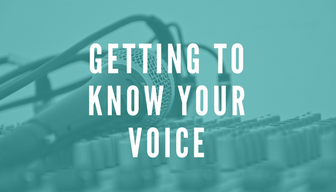"Is that what I really sound like?!"
The first time you hear your voice on a recording, you might be shocked at how different you sound vs. what you thought you sounded like.
What you hear when you're speaking is a combination of your voice coming from your mouth plus the sound from your vocal cord vibrations, whereas when you hear a recording of your voice or when others hear your voice, they only hear what comes out of your mouth.
When you listen back to your first podcast episode, it might be tough to get used to hearing your own voice, and even weirder if you're the one editing it, having to hear it over and over again.
After either hosting or being a guest on more than 150 podcast episodes, I've gotten used to my own voice after two years. (Plus, if you're pulling an all-nighter to edit, you learn to deal with it so you can get your show out on time.) So if you've recorded your podcast but are feeling held back because it's weird to hear your own voice, just know it gets easier.
Think of all the people who have already heard your voice for years. They're used to it! Have they ever said anything to you about your voice? Probably not.
"Do I need to have a 'radio' voice to podcast?"
If that were the case, probably 75 percent of people wouldn't be podcasting. That's one of the best things about this medium. Podcasters don't necessarily fit into a certain mold when it comes to stereotypes. We come from all sorts of backgrounds, with different interests and histories, and none of us have the same story. And the same can be said for voices.
Sure, plenty of people might have their qualms over vocal attributes like crutch words ("like," "um," "you know"), upspeak (ending sentences in a way to make it sound like everything is a question) or vocal fry (ending sentences and phrases on the lower end of their vocal range, resulting in a creaky sound). Personally, I like 99% Invisible's response to these complaints regarding female voice qualms, in particular.
If your own vocal tics irritate you, though, and you'd like to change, there are ways we can work on that together, as well as simply being more aware of it in your every day speech pattern.
Voice tips for podcasters
Even if you aren't used to the sound of your own voice yet, there are still things you can do to help put your best voice forward, helping you sound like the expert you are and speak with authority.
WATER! Make sure you're getting plenty of water. Personally, I find warm water helps loosen my vocal chords in the morning and I tend to drink it faster than cold water. While you might be accustomed to hearing about how eight glasses a day is the magic number, studies differ about how coffee or tea affects that total or how different foods may count toward that total. I recommend drinking water slowly throughout the day whenever you think about it. Set a timer, mark a big water cup with increments and time stamps so you have a goal of how much to drink before certain times, or get a water reminder like the Ulla. (And, by the way, after a week or so of running to the bathroom, your body will adjust to the extra water intake.)
Sing before you record. Take a look at your script and practice it to the tune of music or sing a favorite song before going on the mic to record an interview. Warm up your voice by doing scales ("Do, Re, Mi, Fa ...") if you'd like. This will not only warm up your voice, but activate those vocal muscles to be able to give you a range for your voice so you don't sound too monotone.
Do some mouth exercises. Massage your jaw, open your mouth wide and stick out your tongue, tilt your head up and push your chin toward the ceiling, pretend to chew like a cow, or practice some tongue twisters and emphasize every syllable, consonant and vowel.
These are some of my favorite vocal warm-ups and I make sure to say them slowly and mindfully:
Whether the weather is cold, or whether the weather is hot, we'll weather the weather whatever the weather, whether we like it or not.
Bottle in front of me, frontal lobotomy, bottle in front of me, frontal lobotomy, bottle in front of me, frontal lobotomy.
Eleven benevolent elephants met Lily and Lucy in Philadelphia and went to see Camelot in unique New York with guns and drums and drums and guns which they kept in a bodega bodega bodega. They walked for miles and miles and miles until they saw Manny and Nancy, who walked hand in hand as they sang "Many a moon, many a moon, many a moon." They came across brilliant Italian William from Topeka, who kept murmuring, "Mommala Poppala Mommala Poppala." They asked him to join them. Will you William will you William will you William? Can't you won't you don't you William? Did you would you could you William? But William simply said Lilli Lolli Lilli Lolli. Then round the rugged rock the ragged rascal ran, to be among Culligan and calla lilies, to let his tone hum down as easily as a sigh.
There is a tip about eating a green apple before recording to cut down on mouth noises, but it is only a temporary fix and if you're recording for long amounts of time, you may need to keep snacking on green apple slices throughout. It's much easier to avoid excessive mouth noises by staying hydrated with water or simply being aware of them as you're recording.
If you're concerned with crutch words and phrases, have a friend listen to your normal speaking pattern and count the number of times you use those phrases. Learn to take pauses instead of using crutch words. (Remember, there's no such thing as dead air on a podcast, we can always edit! And it's easier to edit out a pause than trying to splice and dice into a sentence.)
Remember, if your message is good, no one is going to care so much about your voice. Don't let the sound of your own be your hold up in starting or continuing a podcast.
Actionable Tips
Learn to love your voice exactly as it is.
Remember if you have a podcast, you already have the "perfect" podcast voice.
Listen to your episodes and make notes of things you'd like to change in the future.
Don't get hung up on trying to create the perfect audio the first time. It takes practice (and editing).
Take care of your voice and practice using it to create the sound you would want out of your podcast.
WATER, WATER, WATER!
Focus on your message and not so much your voice.
Want to work with me? Schedule a Strategy Session!
Listen to my podcast, The Story Behind.
Visit E Podcast Productions on Facebook.
Follow me on Instagram.


